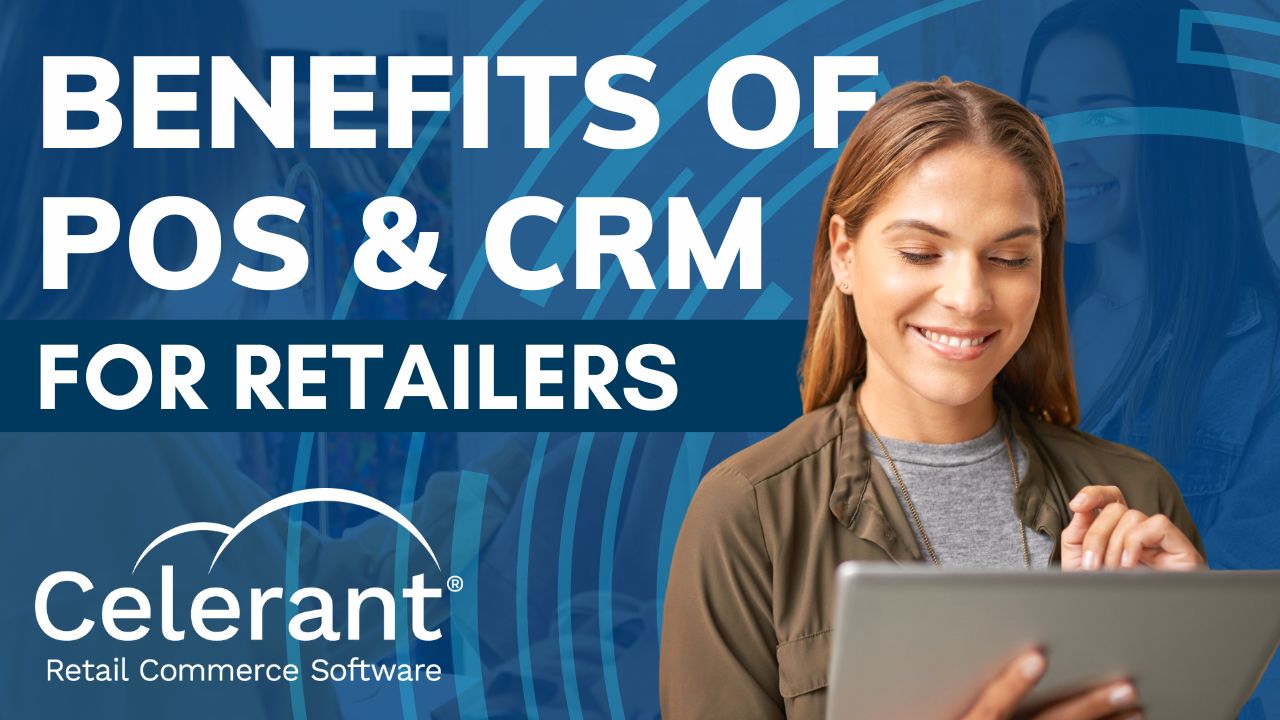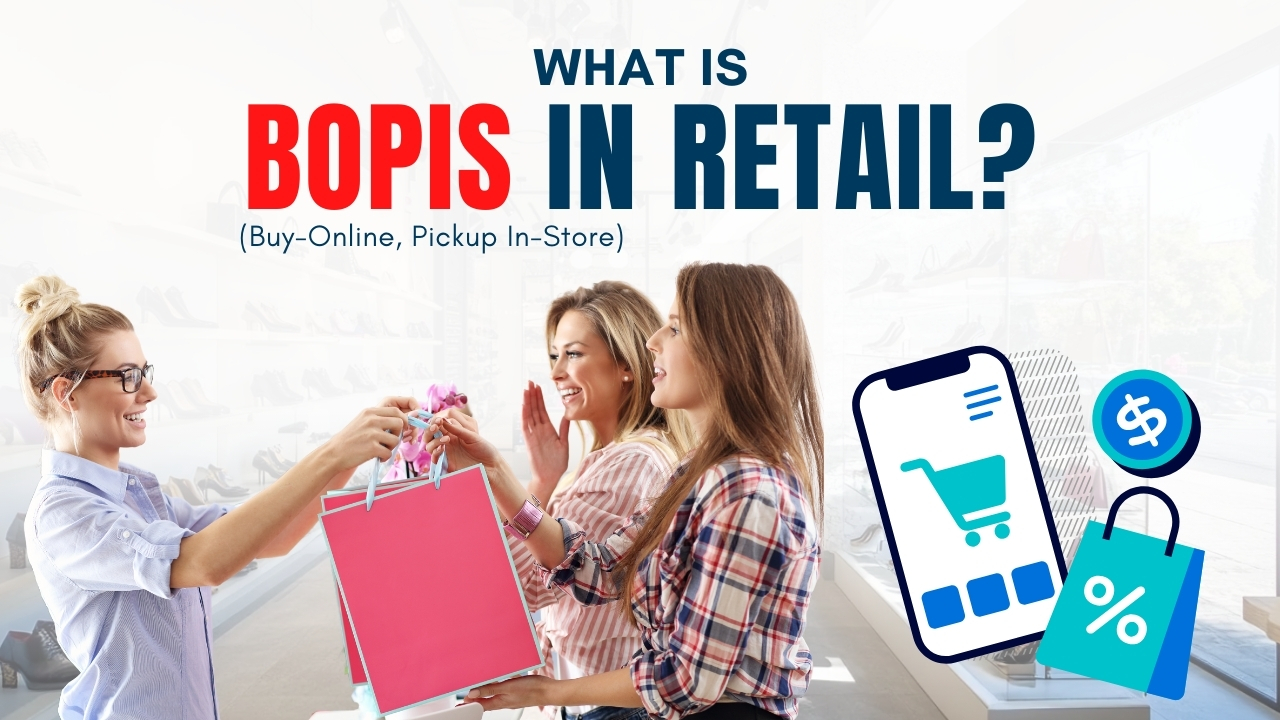Blog
Benefits of POS & CRM Integrations for Retailers
July 27, 2023 / 11 minute read / By Zoya Naeem

Blog

Point of Sale (POS) systems are evolving, and for many retailers, there is no going back to the traditional POS terminals. The days of a point of sale just tracking inventory and sales are over.
Retailers need their point of sale system to help them do so much more. Technological advancements in these newer retail systems make running a business easier than ever. One of the most innovative POS advancements is integration with Customer Relationship Management (CRM) tools, allowing businesses to track leads, monitor customer buying habits, increase sales and save money.
In this blog, we are talking all about the significance and benefits of integrating POS and CRM systems, and how it empowers retailers to elevate their customer relationships, streamline operations, and drive business success.
Unlike traditional POS terminals, which are limited in their capabilities, a cloud-based POS system harnesses the power of the internet to provide a lot of advanced functionalities.
A cloud-based POS system is a software-based solution that operates on remote servers and is accessible through the Internet. It eliminates the need for on-site server hardware installations and enables retailers to leverage the benefits of real-time data processing and analysis.
In one of our prior blogs, we discussed a common question many retailers have: “Do POS systems need the internet to work?” The simple answer is yes- but these days, most POS systems can even still function in an offline mode in the instance that you might lose connectivity.
Many POS systems might offer limited features during internet outages, but then some of the more advanced cloud-based POS systems can fully function in an emergency offline mode- meaning you can process sales, run credit cards, but also you can still have full access to customers, pricing, promotions, etc. Your store won’t even realize it lost internet; when it’s restored, your POS system will be updated as needed.
With a cloud-based POS system, retailers gain the flexibility to run their business from anywhere. Whether it’s taking the system to trade shows, serving customers from different areas of the store, hosting off-site events or sidewalk sales, or even managing the business while traveling, a cloud-based POS system ensures retailers can stay connected and in control.
This innovative technology offers an array of functions designed to streamline operations and enhance the customer experience. From managing sales transactions to overseeing inventory, a cloud-based POS system is a comprehensive tool that empowers retailers with efficiency and agility.
At its core, a POS system acts more like a central hub where sales transactions take place. It allows retailers to process payments swiftly and accurately ensuring a seamless checkout experience for customers. Through a user-friendly interface, sales associates can ring up items, apply discounts, and accept various payment methods, all while reducing human error and speeding up the transaction process.
Additionally, a cloud-based POS system goes beyond traditional transactional capabilities. It provides retailers with real-time inventory management functionalities, allowing them to monitor stock levels, track product movement, and automate reordering processes. This comprehensive inventory management feature helps businesses optimize their stock, reduce holding costs, and avoid stock outs or overstock. Perhaps most importantly- a cloud-based POS system allows retailers to run their business from anywhere- take the system to trade shows, serve customers from anywhere in the store or at off-site events or sidewalk sales, even check in on your business while you are traveling or away from the shop.
By leveraging the power of a cloud-based POS system, retailers can efficiently handle sales transactions, manage inventory, and gain valuable insights into their business operations. It not only streamlines the processes but also sets the foundation for integrating customer data through CRM tools, leading to a more personalized and data-driven approach to retail management.
In the world of retail, CRM systems have become a vital tool for businesses looking to build and maintain strong customer relationships. A CRM system is a software solution designed to help retailers effectively manage their interactions with existing and potential customers.
At its core, a CRM system serves as a centralized repository for customer data, allowing retailers to capture and organize valuable information about their customers. This includes contact details, purchase history, communication preferences, and more. By consolidating this data in one place, retailers gain a holistic view of their customers, enabling them to understand their needs, preferences, and behaviors.
For retailers, customer relationships are like the lifeblood of their business. A CRM system plays an important role in nurturing and strengthening these relationships. By effectively managing customer data, retailers can personalize their interactions, tailor marketing efforts, and deliver exceptional customer experiences.
A CRM system empowers retailers to track customer interactions across multiple touchpoints, such as in-store visits, online purchases, and customer support interactions. This comprehensive view of customer interactions enables retailers to provide consistent and personalized experiences at every stage of the customer journey.
In fact, a CRM system also fuels effective customer communication. Retailers can use the system to:
In addition to managing customer relationships, a CRM system also provides valuable insights through reporting and analytics.
Retailers can run reports on:
By harnessing the power of a CRM system, retailers can elevate their customer relationships to new heights. The integration of POS and CRM systems brings together transactional data from the point of sale with customer data from the CRM system, creating a comprehensive view that fuels personalized marketing efforts, improves customer experiences, and drives business growth.
The integration between CRM and POS systems brings together two powerful tools that are essential for retail success. By connecting these systems, retailers can seamlessly synchronize customer data, transactional information, and inventory management, unlocking a wide range of benefits.
CRM-enabled POS systems can be a valuable tool for any retail business that wants to improve customer service, increase sales, build customer loyalty, manage inventory, and save time and money.
1. Capturing Customer Information Quickly
In today’s competitive retail landscape, capturing customer information quickly and accurately is crucial for personalized marketing and tailored experiences. With integrated POS and CRM systems, retailers can streamline the collection and organization of customer data, ensuring efficiency and accuracy throughout the process. CRM-enabled POS systems automate the process of fetching customer information during sales transactions, eliminating manual entry and reducing errors. This seamless integration.
2. Increasing Sales by Improving Customer Experience
Enhancing the customer experience is a key driver of sales and customer loyalty. Integrated POS and CRM systems empower retailers to provide personalized interactions with customers. By accessing customer profiles and purchase history, sales associates can offer personalized recommendations, cross-sell or upsell relevant products, and deliver exceptional customer service.
The integration of CRM data into the POS system allows for a more holistic view of the customer, enabling retailers to tailor promotions, rewards, and discounts based on individual preferences and behaviors. These personalized experiences foster customer satisfaction, increase sales conversion rates and foster long-term loyalty.
3. Finding Your Most Loyal Customers
By leveraging customer data, retailers can identify their most loyal and valuable customers, known as the ‘Top Spenders.’ CRM-enabled POS systems allow retailers the ability to track customer purchase history, frequency of visits, and engagement levels, providing valuable insights into customer behavior.
With this knowledge, retailers can create targeted marketing campaigns, loyalty programs, and personalized promotions specifically tailored for their Top Spenders. By acknowledging and rewarding these valued customers, retailers foster stronger relationships and incentivize continued patronage.
Moreover, a CRM system enables retailers to send marketing emails and communications precisely to their Top Spenders, providing them with exclusive offers, discounts, and rewards based on their spending behavior. This personalized approach not only enhances customer loyalty but also increases customer retention and boosts overall sales.
If you are interested in learning how to build and nurture a loyal customer base, and how loyalty programs can make things work for you, you can find all the information here.
4. Improving Collaboration Among Departments
Smooth collaboration among different departments is essential for operational efficiency in retail. Integrated POS and CRM systems facilitate seamless information sharing and collaboration among departments, breaking down silos and streamlining processes.
By centralizing customer data ad transactional information, from all retail channels, all departments can access real-time data, enabling efficient inventory management, order fulfillment, and customer service. This integrated approach eliminates manual data transfers, reduces errors, and ensures consistent and accurate information across departments.
The improved collaboration enhances overall operational efficiency, eliminates redundancy, and allows for more informed decision-making.
5. Assisted Selling
CRM-enabled POS systems empower sales associates with access to customer data and purchase history right at their fingertips. This valuable information enables sales associates to understand customer preferences, make informed product recommendations, and personalize the shopping experience.
By leveraging customer insights, sales associates can create a personalized connection with customers, anticipate their needs, and offer tailored solutions. This level of personalized service not only boosts sales but also strengthens customer satisfaction and loyalty.
Certain POS systems can even offer pop-up reminders and notes specific to each customer, to assist your sales clerks during the check-out process and enhance the overall customer experience.
6. Omnichannel Consistency
CRM-enabled POS systems facilitate a seamless omnichannel experience for customers. By integrating online and offline transactions, inventory, and customer data, retailers can provide consistent and personalized experiences across various touchpoints.
Whether customers shop in-store, online, or through mobile apps, their preferences, purchase history, and loyalty information are accessible to deliver a cohesive experience. This omnichannel consistency fosters customer satisfaction, builds brand loyalty, and enhances the overall shopping journey.
7. Data-Driven Decision Making
The integration of CRM and POS systems enables retailers to make data-driven decisions. Comprehensive reporting and analytics capabilities provide insights into sales performance, customer behavior, and marketing campaign effectiveness. By analyzing this data, retailers can identify trends, evaluate strategies, and make informed decisions that drive growth.
With a deep understanding of customer preferences and market dynamics, retailers can optimize their product offerings, pricing strategies, and marketing efforts.
Data-driven decision-making ensures that retailers can adapt to changing market conditions, enhance customer satisfaction, and stay ahead of the competition.
8. Personalized Marketing to your Customers
Integrated POS and CRM systems empower retailers to elevate their marketing strategies through personalized communication with customers. By leveraging the wealth of customer and sales data available, retailers can completely transform their marketing approach. Sending targeted emails based on this data allows you to send the right message to the right customer at the right time, resulting in a significant increase in marketing success.
With the power of integrated data, you can identify customer preferences, past purchases, and communication preferences. This valuable insight enables you to create highly targeted marketing campaigns that resonate with individual customers. Whether it’s suggesting complementary products, offering exclusive promotions, or acknowledging special occasions, personalized marketing makes customers feel valued and understood.
By automating email campaigns based on customer behavior, such as abandoned carts or previous purchases, you can deliver timely and relevant messages that capture customers’ attention. This level of personalization enhances customer engagement and significantly boosts conversion rates.
If you are considering implementing a CRM-enabled POS system in your retail business, here are a few things you should keep in mind:
The integration of POS and CRM systems offers a multitude of benefits for retailers, empowering them to elevate customer relationships, streamline operations, and drive business success. By capturing customer information quickly and accurately, retailers can personalize marketing efforts and provide tailored experiences that foster loyalty and satisfaction.
CRM-enabled POS systems not only improve the customer experience by enabling personalized interactions but also:
While there are hundreds of technology companies out there today with POS and CRM integrations, Celerant, carries over twenty years of experience in providing advanced retail business software solutions for SMBs and advanced retail enterprises.
 Discover how BOPIS can help you improve sales and customer satisfaction. And how using the right retail… |
 Tis the season, so be ready! Read these quick 5 tips about being successful over Black Friday and Cyber… |